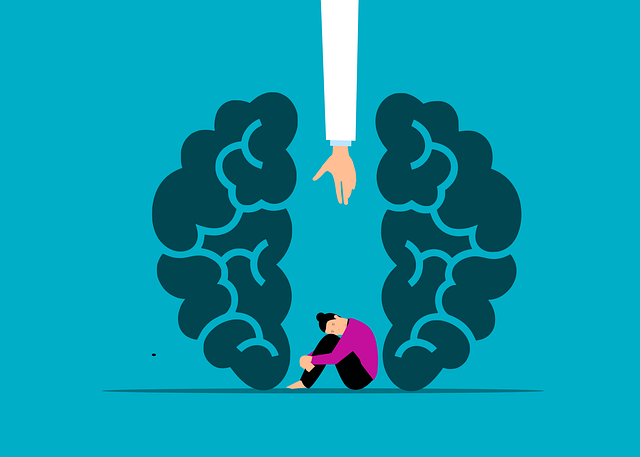Adolescent mental health requires specialized programs addressing challenges like anxiety, depression, and disordered eating. Therapy for Adolescent Teens (TAT), particularly Exposure and Response Prevention (ERP), is an effective CBT approach. By combining ERP with cultural sensitivity and practical tools, a holistic program empowers teens to manage their well-being. Interactive workshops, group discussions, and podcasts enhance engagement, knowledge retention, and symptom reduction, fostering resilience in adolescent mental health.
Mental health issues among adolescents are on the rise, highlighting the urgent need for comprehensive education programs. This article explores the design of an effective mental health education program focused on empowering teens with coping strategies. We delve into the unique challenges adolescents face, emphasizing the role of Therapy for Adolescent Teens. Specifically, we highlight Exposure and Response Prevention (ERP) as a powerful CBT technique. By integrating ERP into educational programs, we can facilitate learning and foster resilience in young minds.
- Understanding Adolescent Mental Health Needs and Therapy for Teens
- Exposure and Response Prevention (ERP): A Key Strategy in Cognitive Behavioral Therapy (CBT)
- Designing an Educational Program: Incorporating ERP Techniques for Effective Learning
- Strategies for Implementing and Measuring Success of the Mental Health Education Program
Understanding Adolescent Mental Health Needs and Therapy for Teens

Adolescent mental health is a specialized field that requires tailored programs to address unique challenges faced by teens. This demographic often struggles with issues like anxiety, depression, and disordered eating, which can stem from various factors including peer pressure, academic stress, and social media influence. Understanding these complexities is crucial for designing effective interventions. One evidence-based approach gaining traction in mental health education is Therapy for Adolescent Teens (TAT), specifically Exposure and Response Prevention (ERP).
ERP is a form of cognitive behavioral therapy that helps teens confront fears and anxiety triggers in a safe, controlled environment, gradually reducing avoidance behaviors. By implementing community outreach programs focused on TAT and incorporating engaging communication strategies, mental health awareness can be fostered effectively. This approach not only empowers adolescents but also equips them with tools to manage their well-being, promoting resilience and healthier coping mechanisms.
Exposure and Response Prevention (ERP): A Key Strategy in Cognitive Behavioral Therapy (CBT)

Exposure and Response Prevention (ERP) is a powerful strategy within Cognitive Behavioral Therapy (CBT), particularly effective for treating anxiety disorders among adolescent teens. This approach involves gradually exposing individuals to feared situations or objects while teaching them strategies to manage and prevent impulsive responses, such as avoidance behaviors. By facing their fears in a safe, controlled environment, teens learn to change their thoughts and emotions, ultimately reducing anxiety symptoms.
ERP is tailored to address the unique needs of each teen, incorporating cultural sensitivity in mental healthcare practice to ensure inclusivity and effectiveness. This strategy helps adolescents develop emotional regulation skills, enabling them to cope with challenging situations more adaptively. By combining ERP with CBT, therapists empower teens to take control of their mental wellness, fostering resilience and a sense of empowerment.
Designing an Educational Program: Incorporating ERP Techniques for Effective Learning

Designing an educational program for mental health involves incorporating evidence-based techniques that foster effective learning and skill development in adolescents. One such technique is Exposure and Response Prevention (ERP), a therapeutic approach often used to treat anxiety disorders. ERP involves gradual exposure to feared situations, accompanied by a strategy to prevent engaging in habitual avoidance behaviors. By combining this with structured learning environments, teens can learn coping mechanisms while navigating their anxieties, ultimately improving their mental wellness.
Incorporating ERP techniques into an educational program requires careful curriculum design that balances theoretical knowledge and practical exercises. Mental wellness journaling exercises can serve as a powerful tool for reflection and self-monitoring during exposure tasks. Additionally, producing a mental wellness podcast series can offer guided discussions on various topics, normalizing conversations about mental health while providing alternative guidance for self-esteem improvement.
Strategies for Implementing and Measuring Success of the Mental Health Education Program

Implementing a comprehensive mental health education program requires a multi-faceted approach. One effective strategy is integrating evidence-based therapies like Exposure and Response Prevention (ERP), which has proven successful in treating anxiety disorders among adolescent teens. This involves teaching participants gradual exposure to feared situations, coupled with strategies to resist the urge to engage in habitual avoidance behaviors. Such therapeutic techniques can be incorporated into interactive workshops, group discussions, and role-playing scenarios for enhanced learning.
Measuring the success of these programs is equally vital. Key performance indicators (KPIs) could include participant engagement levels, knowledge retention post-training, and changes in mental health symptoms as reported through validated questionnaires or self-assessments. Additionally, gathering feedback from both participants and healthcare providers through surveys can offer valuable insights into the program’s effectiveness, with a focus on enhancing emotional intelligence and cultural competency training for healthcare providers. Complementing these efforts, producing a Mental Wellness Podcast Series can further extend the reach of the program, sharing insights and practical tips with a broader audience.
Mental health education programs play a pivotal role in addressing the unique needs of adolescent teens. By incorporating evidence-based strategies like Exposure and Response Prevention (ERP), these programs can significantly enhance cognitive behavioral therapy (CBT) outcomes. A well-designed curriculum, tailored to engage young minds, ensures effective learning and empowers teens with essential coping mechanisms. Successful implementation requires a multi-faceted approach, including clear goals, teacher training, and regular evaluation, enabling us to create a more resilient and healthy future for our adolescents.








